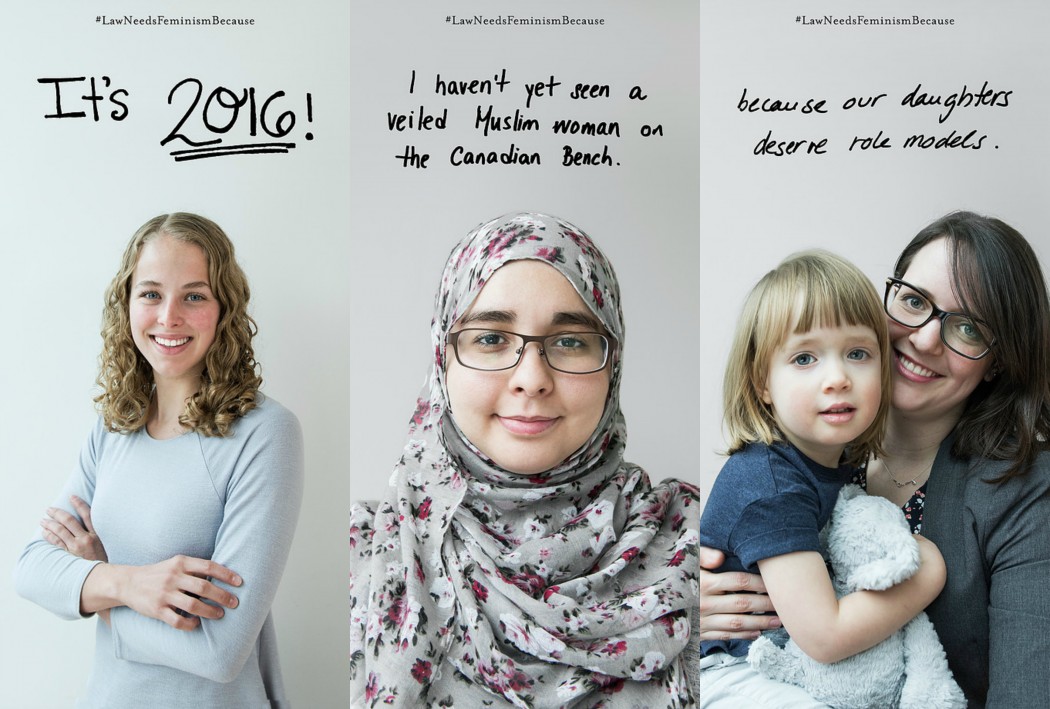The Feminist Collective of McGill Law began in 2012 with the aim of intersecting feminism within law and opening a forum for dialogue through written and artistic expression. The collective had its first photo campaign in 2014, and in 2016, transformed into #LawNeedsFeminismBecause/LeDroitABesoinDuFeminismeCar, introducing its second campaign which calls for action, empowerment, and the intersectionality of feminism. #LawNeedsFeminismBecause was headed by McGill Law students Rachel Kohut and Vanita Sachdeva. The collective asked over thirty individuals to finish the sentence: “Law Needs Feminism Because…” and pose for a professional portrait. The end result is a powerful call for empowerment, feminism, and social change.
An Open Dialogue
#LawNeedsFeminismBecause highlights many issues regarding feminism and the law including, but not limited to: sexual assault, LGBTQ rights, visibility of minorities, and sexist job interview conduct. There is a crucial need for both dialogue and feminism within the court of law. #LawNeedsFeminismBecause is seeking to broadly discuss more ways to overcome the “old boys club” that continues to plague the Canadian legal system and profession as a whole.
Letting Their Voices Be Heard
For participants in the project, speaking out about why the current system of law in Canadian society needs feminism is crucial. Some stated that “No one should be told to keep their knees together”, “Challenging perspectives leads to great ideas”, and “There’s no Old Girls Club, YET”. These powerful statements, alongside others, propel the movement forward while pushing boundaries and calling for change.
A One-on-One with Rachel Kohut
Rachel Kohut is the organizer behind the #LawNeedsFeminismBecause 2016 photo project, which is featured in greater detail on their website. We sat down with Rachel to learn more about the movement from the inside out.
B&B: How was #LawNeedsFeminismBecause received by the Law community at McGill?
RK: “It’s been incredible to see the overwhelming support towards the campaign. People keep coming up to me and talking about it. Needless to say, it definitely created a buzz within the Faculty.”
B&B: Has it made an impact on the greater Montreal area? Or even the national stage?
RK: “Yes, there has definitely been a buzz around the campaign, near and far. Friends in other corners of the country have also told me that their colleagues have talked to them about it, which is exactly the kind of dialogue we’re trying to ignite.
The campaign was also written up by the Canadian Broadcasting Corporation (CBC) last week, and on the same day, we were interviewed on CBC’s radio show “Home Run”. It has also infiltrated the twitter verse, and one participant told me that it has made it as far as Jordan. Several other law faculties—and medicine faculties—have also reached out to do something similar, and I hope to get in touch with them in the upcoming weeks to talk about how to move forward.”
B&B: Has the collective shifted focus from its inception until now? How so?
RK: “I guess you could say I inherited the hashtag #LawNeedsFeminismBecause when I signed up to take on the photo campaign, but I knew I wanted it to spark conversation and be artistically driven. Thankfully, Vanita Sachdeva came on board to help out with logistics, and I turned to an old contact in Ottawa, photographer Whitney Lewis-Smith, as well as friends at Log Creative Bureau to really weave the whole thing together.”
B&B: What are your short and long-term goals for the collective?
RK: “The short-term goal was to release it before the end of the semester, which we did. During the photo-shoot, people hung around talking about what they wanted to write down. There was a lot of thought that went into those captions. It was those conversations that made me realize that this campaign had already achieved what it sought out to do.
In the long-term, I hope to work with other law faculties—and hopefully medicine faculties too—to help inspire and continue the conversation across the country, and maybe even beyond.”


